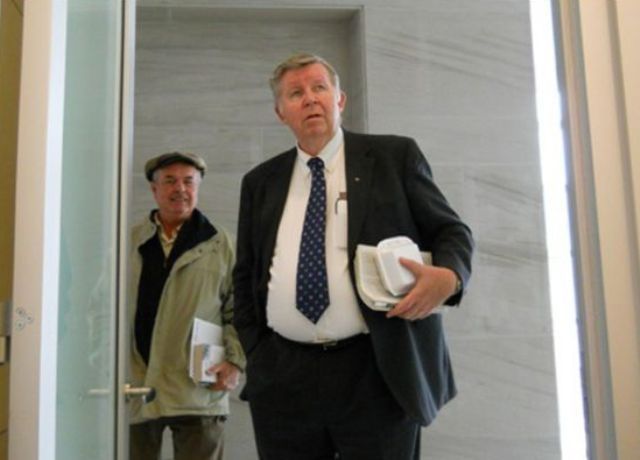Colorado justices weigh path forward after SCOTUS decision conflicts with ‘3 strikes’ law
Members of the Colorado Supreme Court considered on Tuesday the request from prosecutors, on the one hand, to interpret the state’s “three strikes” law in a way that is constitutionally compliant, and the defense community’s argument, on the other hand, that the law should be struck down.
Known as the Habitual Criminal Act, the law requires judges to impose three or four times the maximum sentence if a defendant is convicted of a felony and has multiple prior felonies. However, those prior convictions must arise “out of separate and distinct criminal episodes.” Prior to 1995, juries made that determination, but that year lawmakers changed the law to entrust judges with the task.
Then the U.S. Supreme Court stepped in last June. By 6-3, the justices ruled in Erlinger v. United States that the U.S. Constitution requires juries to decide beyond a reasonable doubt whether a defendant committed prior felonies on different occasions.
In oral arguments to the state Supreme Court addressing the fallout, all sides agreed Erlinger applied to Colorado’s Habitual Criminal Act and the procedure had to change going forward. But is the law itself unconstitutional?
“Why is it beyond the pale to say the statute does not expressly preclude a jury?” wondered Justice Richard L. Gabriel. “So, we’re going to read it to preserve its constitutionality to say a jury needs to be involved and make those fact findings, and then the judge can enter judgment or do whatever else.”
At the time the Erlinger decision dropped, a Mesa County jury had recently convicted Andrew Gregg of two felonies and one misdemeanor. Prosecutors also alleged Gregg should be sentenced as a habitual criminal because he had four prior robbery convictions — but the priors were not part of the jury’s verdict.
After Erlinger and in anticipation of Gregg’s sentencing, the defense moved to dismiss the habitual criminal counts because Gregg disputed whether three of his prior convictions were from “separate and distinct” episodes. The prosecution conceded Erlinger meant such questions could no longer be decided by judges after the jury’s verdict. But it argued a “replacement jury” could determine whether Gregg qualified as a habitual criminal.
In a Sept. 9 order, District Court Judge Matthew D. Barrett believed there could be no further proceedings on the habitual criminal allegations. He invoked the constitutional prohibition on double jeopardy, reasoning that case law prohibited him from assembling another jury after the prosecution already had the chance to prove its allegations beyond a reasonable doubt.
“While acknowledging that at the time of trial the prosecution did not know that it needed to prove Defendant’s habitual criminal counts to the jury, I am nonetheless bound to follow applicable law,” Barrett wrote.
The district attorney’s office appealed directly to the state Supreme Court, arguing the principle of double jeopardy does not apply in Gregg’s scenario.
The justices invited outside entities to weigh in on the path forward. The Colorado Attorney General’s Office and Colorado District Attorneys’ Council suggested there was a way to comply both with Erlinger and the law as written: Judges can either retain the jury or assemble a new one to decide whether a defendant qualifies as a habitual criminal. If the jury says yes, the judge can double check the verdict, given that the law requires at least some level of judicial involvement.
On the other hand, the public defender’s office, Colorado Criminal Defense Bar and the ACLU of Colorado, among other groups, suggested the Habitual Criminal Act was unconstitutional, bad public policy or both. Because it was impossible to nullify the language requiring judges to weigh someone’s prior convictions and be left with an intelligible law, they argued the court should strike it down entirely and let the legislature figure out what to do next.
During arguments, Chief Justice Monica M. Márquez asked about Senate Bill 189, which is currently awaiting a hearing in the General Assembly. As drafted, it would explicitly substitute juries for trial judges in the task of resolving factual disputes over a defendant’s prior convictions.
Britta Kruse, the attorney for Gregg, said she believed the bill was unconstitutional. She added that with the $1 billion budget deficit the state is facing, “there might be some thinking about whether this policy of paying to incarcerate people for up to their lifetime makes sense.”
The government countered that the Habitual Criminal Act has been in place for nearly 100 years — albeit with origins in the eugenics movement of the early 20th Century. When lawmakers reassigned the jury’s role to judges in 1995, it was in the name of making habitual proceedings more efficient.
“It is very clear that the legislators did not consider this to be an important or substantive change,” said Special Deputy District Attorney Johanna G. Coats.
In considering whether Erlinger could be harmonized with the law as-is, Justice Melissa Hart pointed out that unlike related provisions in other states, Colorado’s law describes the role of judges without technically barring jury involvement.
“Our statute doesn’t prohibit a jury,” she said. “Our statute is silent on a jury.”
Justice Carlos A. Samour Jr. did not attend the arguments. Márquez said Samour “cannot be here today,” but that he will participate in the decision.
The case is People v. Gregg.














